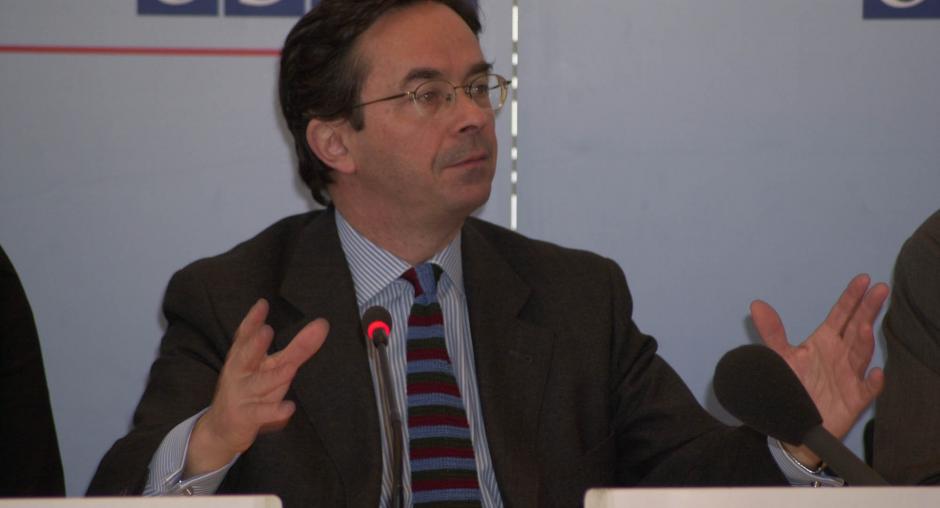Newsroom
Meeting on Roma and Sinti boosts preparation of OSCE Action Plan
VIENNA 10 April 2003

(OSCE/Ayhan Evrensel)ODIHR Director Christian Strohal at a press conference on the occasion of a special two-day meeting on Roma and Sinti issues, Vienna, 10 April 2003. (OSCE/Ayhan Evrensel) Photo details
VIENNA, 10 April 2003 - A special two-day OSCE meeting on Roma and Sinti has provided a strong impetus for the preparation of an Action Plan to be adopted in December by the Organization's main decision-making body, the Ministerial Council.
More than 200 government experts and representatives of non-governmental organizations, among them many Roma and Sinti, have gathered in Vienna today to discuss how the Action Plan can best address the specific problems faced by Roma communities and related groups across the OSCE region.
"As the Action Plan will be developed and agreed by the OSCE governments, this meeting provides an important opportunity for Roma NGOs to provide input and make their views heard at the outset of the process," said Ambassador Christian Strohal, the Director of the OSCE Office for Democratic Institutions and Human Rights (ODIHR).
"We need to ensure that this Action Plan will not be just another piece of paper, but a document that will have a concrete impact on the situation of Roma and Sinti. The importance of NGOs in this process, in particular those representing the Roma themselves, cannot be overstated," he said.
Ambassador Strohal also stressed the OSCE's added value in addressing Roma and Sinti issues: "Unlike other organizations, the OSCE, as a political body with highly operational specialized institutions and field missions, can react very quickly to emerging problems or increasing tensions - both at the political level and on the ground."
The meeting focuses on issues such as the prospects for the return of Roma refugees to post-conflict areas in south-eastern Europe, cross-border movements of Roma within Europe, and combating discrimination.
The meeting will also discuss a proposal by a group of NGOs to establish a standing consultative body - representing Roma organizations - to provide input to the working group which has been set up by the OSCE's 55-nation Permanent Council for the purpose ofdeveloping the Action Plan on Roma and Sinti.
More than 200 government experts and representatives of non-governmental organizations, among them many Roma and Sinti, have gathered in Vienna today to discuss how the Action Plan can best address the specific problems faced by Roma communities and related groups across the OSCE region.
"As the Action Plan will be developed and agreed by the OSCE governments, this meeting provides an important opportunity for Roma NGOs to provide input and make their views heard at the outset of the process," said Ambassador Christian Strohal, the Director of the OSCE Office for Democratic Institutions and Human Rights (ODIHR).
"We need to ensure that this Action Plan will not be just another piece of paper, but a document that will have a concrete impact on the situation of Roma and Sinti. The importance of NGOs in this process, in particular those representing the Roma themselves, cannot be overstated," he said.
Ambassador Strohal also stressed the OSCE's added value in addressing Roma and Sinti issues: "Unlike other organizations, the OSCE, as a political body with highly operational specialized institutions and field missions, can react very quickly to emerging problems or increasing tensions - both at the political level and on the ground."
The meeting focuses on issues such as the prospects for the return of Roma refugees to post-conflict areas in south-eastern Europe, cross-border movements of Roma within Europe, and combating discrimination.
The meeting will also discuss a proposal by a group of NGOs to establish a standing consultative body - representing Roma organizations - to provide input to the working group which has been set up by the OSCE's 55-nation Permanent Council for the purpose ofdeveloping the Action Plan on Roma and Sinti.
